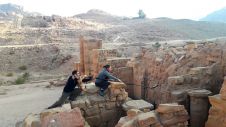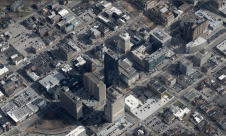A World Class African Land Information System
GIM International Interviews Marcelle Hattingh
In Johannesburg, one of the cities hosting this summer's FIFA World Cup, GIS specialists at the Corporate Geo-Infomatics Directorate are working hard to ensure their city, department and Land Information System (LIS) meet the standards required by a venue for the world's biggest sports event. Director Marcelle Hattingh is leading the team through one of the biggest projects ever.
Ambitions are high in Johannesburg, South Africa. The city is working hard to become A World Class African City, a concept aimed at preparing and uplifting South African cities for the FIFA World Cup 2010. In the midst of Jo'burg's Central Business District, City Hall is located in the Metro Centre. At the Corporate Geo-Informatics Directorate, almost sixty GIS specialists are working to make theirs a world-class GIS department, echoing the efforts of the city of Johannesburg. Under the visionary leadership of director Marcelle Hattingh, the directorate has been transformed, turning the Geo-Informatics Directorate of Jo'burg and its projects into an example to be followed. The Directorate has received an ESRI Achievement Award in special recognition of its work in transforming the GIS into an enterprise Land Information System.
How would you describe Jo'burg's Land Information System?
The Land Information System is a system that brings together data from several sources responsible for property information relating to the city, to name a few: Corporate Geo-Informatics of the Development Planning Department, Valuations and Rates & Taxes of the Finance Department, and the Revenue and Customer Relation Management Department. Maps, property information and billing information are combined in the integrated LIS. In other words, the LIS is the single, spatially-enabled source of property information in the City of Johannesburg. In this Property Value Chain the lifecycle of a property is integrated from the moment of submission of a development application to the generation of a bill.
Why was it important to work towards this integrated system?
Data management in the city of Jo'burg was poor overall, with standalone property databases in the departments Valuations, GIS, Planning and Billing and Deeds. Duplication, fragmentation and incompatibility were the result. To meet the world's best practices in processes, systems and people, we needed to transform the level of service and best service delivery model into property services. Ultimately, to become a World Class African City we needed simply to integrate all property services in one single system.
Data coming from different sources are not always up to date or matching. Are your databases clean now?
No, we are still very much in the process of cleansing the data. We are updating our whole database on a weekly basis, leaving out the dirty data. Also, all new ideas for preventing data from becoming dirty again are shared and, if applicable, implemented.
Who are your partners outside the Corporate Geo-Informatics System?
Of course, we need a lot of partners to make this project a success. We wanted to integrate the GIS with LIS and combine it with aerial photography. We therefore worked with, for instance, Jo'burg-based Southern Mapping, a company that specialises in aerial survey and airborne remotely sensed aerial imagery. They flew the whole metropolitan area, so that we were able to add images to the layers, adding another dimension to the data that simplifies the validation and extraction of data. This also reduces the workforce needed on the street, so making us much more efficient.
We are teaming up with ESRI to implement new ArcGIS applications and enhance the skills of our personnel to work with this technologically advanced database. We also worked with several other service providers as a team in developing the LIS.
It sounds like you also need a lot of management skills to make a success of a project like this?
Definitely! There's much more to it than just integrating databases with available technologies. I'd even dare to say that eighty % of the project came down - and still comes down - to change management. It's cultural; it's about changing attitudes, enhancing skills. Everyone working in management knows that managing change is one of the most challenging and difficult aspects of their job. People are naturally inclined to resist change.
What about other challenges?
Another big challenge is to cooperate on the borders of our jurisdiction; we are dealing with the city, the provincial government of Gauteng and regional authorities. Sometimes roads are national, sometimes municipal or provincial. Hospitals are national institutions; libraries, in contrast, are the responsibility of city councils. This can demand a good deal of diplomacy and logistics.
Who gains most from the new LIS?
Firstly, the city of Jo'burg, because we've improved operations along the whole Property Value Chain; all systems are used optimally now, because the LIS is the only source of information for the city. As I've said, duplication is eliminated and new technology has been introduced to the city's GIS and IT environment. But also citizens are taking advantage of this new system. The chance of receiving an inaccurate bill after a property transaction is greatly reduced. They have easy access to information regarding their current or future property; everything is accessible via the internet, including the layer of aerial imagery we have added. Queries are fewer and require less time to resolve thanks to the accuracy of the LIS. And, last but not least, employees of our department and other departments within the city council who need to work together are now crossing boundaries. New technology has become available which has increased the opportunities and chance of developing skills in working with that technology. All this has helped turn us into a World Class GIS directorate.
Driving through South Africa one is struck by the huge townships on the borders of big cities like Cape Town and Johannesburg. What challenges do they imply for your department?
Informal settlements, as we call them, are of course always interfering with the formal process. You have to find ways of dealing with these immense and sometimes volatile residential areas. These less formal settlements are reality for a third of the households in Johannesburg; in our city of more than a million households, this means that around 350.000 families are living in less formal townships. Some townships have been in existence for decades, other pop up over a few weeks and sometimes disappear just as fast. Often there's no electricity or other services, and people are living under very poor circumstances. The city is looking into regularisation of the informal settlements, so they are certainly having a big impact on our department.
Why is the council now regulating informal settlements?
You can't simply say, ‘it's informal so it's not there'. The city has a responsibility to provide electricity, drinking water and sewerage for all its citizens. Also, fire departments and ambulances need to be able to gain access to the townships to provide for a safer and healthier environment. And what informal settlers, township dwellers, need in order to be able to enter the economic cycle is an address. An address makes you visible for the government, but also for ambulances and other emergency services. A bank will need an address to open a bank account, and loans are only made to people with physical addresses. An address makes your life wealthier, healthier and safer. This is of course right up our alley as a GIS department! We are starting now to give out street addresses in those townships that were previously excluded. We plan to carry this process on through all the townships.
This year the World Cup is being held in South Africa and Jo'burg is one of the host cities. What's the effect of this major sporting event on your department?
The effect of the World Cup is immense, including on our department. We have been subcontracted to capture all the necessary data, for instance on basic and emergency bus and auto routes, road works and public transport, and this is being done now for the first time in the city's history. People are encouraged to upload data on places to stay, bed & breakfasts and hotels, restaurants and cafés, and so forth. Until now we've never had all this information. To me, this is the most exciting aspect of the World Cup. We'll have loads of new data over the next few years.

Value staying current with geomatics?
Stay on the map with our expertly curated newsletters.
We provide educational insights, industry updates, and inspiring stories to help you learn, grow, and reach your full potential in your field. Don't miss out - subscribe today and ensure you're always informed, educated, and inspired.
Choose your newsletter(s)
























